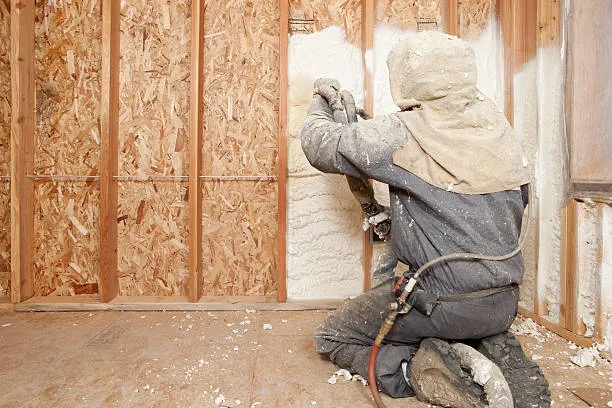
When it comes to keeping buildings comfortable and energy-efficient, insulation plays a crucial role. However, not all insulation is created equal. The choice between commercial insulation and residential insulation solutions can significantly impact a structure’s energy performance and overall comfort. In this blog, we’ll explore the key differences between these two types of insulation and determine which one is more efficient for various applications.
Before diving into the comparison, it’s essential to understand what sets commercial and residential insulation apart. Residential insulation is typically designed for homes and smaller buildings, focusing on maintaining a comfortable living environment. On the other hand, commercial insulation is engineered for larger structures such as office buildings, factories, and warehouses, with a primary goal of maximizing energy efficiency on a grander scale.
When it comes to thermal performance, both commercial and residential insulation solutions have their strengths. Home insulation products often prioritize comfort, aiming to maintain a consistent indoor temperature throughout the seasons. These materials, such as fiberglass batts or blown-in cellulose, are excellent at reducing heat transfer in smaller spaces.
Commercial insulation, however, often deals with more complex thermal challenges. Large buildings face unique issues like stack effect and greater temperature differentials between floors. As a result, commercial-grade insulation materials like spray foam or rigid board insulation tend to have higher R-values per inch, providing superior thermal resistance in demanding environments.
Commercial buildings typically experience more wear and tear than residential structures. This increased stress extends to the insulation as well. Commercial-grade insulation is often designed to withstand higher levels of foot traffic, moisture exposure, and temperature fluctuations. Materials like closed-cell spray foam or phenolic foam boards offer excellent durability and moisture resistance, making them ideal for commercial applications.
Residential insulation, while still durable, may not need to meet the same rigorous standards. However, modern home insulation products have come a long way in terms of longevity. Many residential-grade materials now offer excellent long-term performance, especially when properly installed and maintained.
When it comes to cost, residential insulation often has the advantage. The materials used in home insulation, such as fiberglass or cellulose, are generally less expensive than their commercial counterparts. Additionally, the installation process for residential insulation is typically less complex, resulting in lower labor costs.
Commercial insulation, due to its higher performance requirements and more extensive installation processes, tends to come with a higher price tag. However, it’s important to consider the long-term savings in energy costs that commercial-grade insulation can provide, especially for large buildings with significant heating and cooling demands.
Both residential and commercial insulation play crucial roles in reducing energy consumption and, consequently, lowering carbon emissions. However, commercial insulation often has a more significant environmental impact due to the sheer scale of the buildings it’s used in. High-performance commercial insulation can lead to substantial energy savings in large structures, contributing to a greener built environment.
Residential insulation, while operating on a smaller scale, is no less important. Proper home insulation can significantly reduce a household’s carbon footprint and energy bills. Many modern residential insulation products are also made from recycled or sustainable materials, further enhancing their eco-friendly credentials.
The installation process for commercial and residential insulation can vary significantly. Residential insulation installation is often straightforward, with common methods including rolling out fiberglass batts or blowing in loose-fill insulation. While professional installation is recommended for optimal performance, some homeowners choose to tackle residential insulation as a DIY project.
Commercial insulation installation, on the other hand, is typically more complex. It often requires specialized equipment and expertise, particularly for spray foam or large-scale rigid board applications. The intricacies of commercial building designs, such as complex HVAC systems or unique architectural features, can further complicate the installation process.
When it comes to adapting to specific building needs, commercial insulation often has the edge. Commercial-grade products are available in a wide range of formulations and application methods, allowing for precise customization to meet the unique requirements of different building types and climates.
Residential insulation, while more limited in variety, still offers ample flexibility for most home applications. The key is to choose the right type of insulation for each area of the house, considering factors like moisture levels, temperature fluctuations, and local climate conditions.
Ultimately, the question of which is more efficient – commercial or residential insulation – doesn’t have a one-size-fits-all answer. The efficiency of insulation depends largely on the specific context in which it’s used.
For homes and smaller buildings, residential insulation often provides the best balance of performance, cost-effectiveness, and ease of installation. It’s designed to meet the unique needs of living spaces, focusing on comfort and energy efficiency on a household scale.
Commercial insulation shines in larger, more complex structures where high performance and durability are paramount. Its superior thermal resistance and ability to withstand demanding environments make it the go-to choice for commercial and industrial applications.
In conclusion, both commercial and residential insulation have their place in creating energy-efficient, comfortable spaces. The key is to assess your specific needs and choose accordingly. Whether you’re insulating a cozy home in Spring Creek or a sprawling office complex in Elko, selecting the right insulation solution is crucial for maximizing efficiency and comfort.
For expert advice on choosing the best insulation for your property in Spring Creek, Nevada, and surrounding areas, including Eureka, Winnemucca, and Elko, don’t hesitate to reach out to Nevada Urethane. Our team of professionals can help you navigate the world of insulation and find the perfect solution for your needs. Contact us today at (775) 397-2820 to schedule a consultation and take the first step toward a more energy-efficient future.